Jan 23, 2024 | Editors' Blog, Interviews
Today, we’re talking with Matt Armstrong, about his book In Like Lloyd: An Urban Fantasy Mystery (Noctis Investigations Book 1).
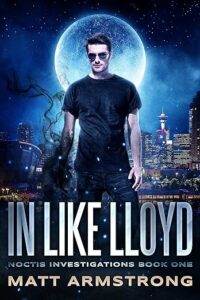
Tell us something unexpected about yourself!
I'm forklift certified.
Why do you write?
I love telling stories, and enjoy seeing reactions to the things I've come up with. I enjoy making people laugh and think about things in different ways. I love inspiring and entertaining, but at the end of the day, my writing is for me first and foremost. Even if I never sold a single copy, I'd remain content that I wrote it, and hold it close to my heart for the rest of my life.
Where did you get the inspiration for your current book?
Originally, I'd say Robert Jordan, Robin Hobb, Terry Brooks and Terry Goodkind. They inspired me to write my own fantasy epic when I was a teenager, but I hated it and never moved forward with it.Then I found the likes of Neil Gaiman and Terry Pratchet (lots of Terrys in Fantasy) and loved the blending of humour into darker themes. When I discovered Jim Butcher, Urban Fantasy quickly developed into my favourite genre, and Lloyd Gibson began taking shape in my head.
What do you enjoy the most about your genre?
You can do literally anything you want, especially when you add science fiction elements into the story. If I decided a 50 foot tall giant would climb out of the Earth and use the Calgary Tower as a baseball bat to fight an alien menace, I could make it fit within my narrative. It also gives me the ability to use real-world references, which help readers, and myself, relate to my characters.
How would you describe your writing process?
Literally by the seat of my pants, and I try to write as raw as possible. Get the story out, and not get bogged down with how to phrase things, which dialog tags to use, or “What are Lloyd's hands doing right now?” Those are all things left for the touch-ups and edits. Get what I want written down, and clean it up later. I don't like storyboards and thousands of notes. They work great for a lot of authors, but I only end up staring at them, overthinking, and not writing.
I begin each book with an idea, a concept, and just sit down and start. 70% of what I end up writing wasn't even a part of the initial plan, and just came out of me in the moment. If I'm not sure where to go next, or how to lead into the next idea, I just send Lloyd out into the world and see what happens. I often write my characters into corners with no preceivable way out, but it forces me to find one, and make it believable. I'm constantly challenging myself this way, and it's led to things I'm very proud of.
There have been many times I started a chapter, knowing for sure what I was going to write, and ended up with something completely different. I love it that way, because how will my readers predict what will happen when I don't even know?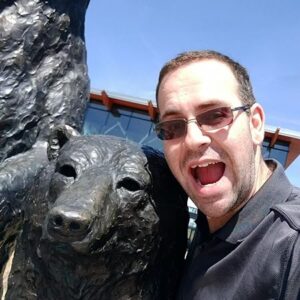
What do you think authors have to gain from participating in social media?
The ability to reach a wider audience, and a series of headaches. I'm honestly terrible at social media, but I'm working on it. It's never been a large part of my life, and entering it now is a daunting task.
What advice would you have for other writers?
Take your inspirations, but leave them as inspiration only. Write your stories for yourself, first and foremost, and worry about target audiences after. Don't strive to become the next Stephen King. Strive to become the first YOU.
How do you select your books’ titles and covers?
The titles are either very easy or very difficult. Every title is a play on a specific phrase, and finding what works with each book is harder than you'd think. “In Like Lloyd” came to me immediately, but “A Matter of Lloyd and Death” started out as “In The Shadow Of Lloyd”, and kept that title for most of its pre-release existence. I honestly only changed it because a future book demanded a similar title. I consider the themes of each book, find a phrase that fits, and roll with it. My favourite is book 3, “When Lloyds Collide”, because it fits with four different themes happening in that story.
As for the covers, I put my trust in my designers. I give them the basics (location, season, etc) and a list of ideas, and see what comes out. They use stock photos, so we're limited in what we can do, but I'm quite happy and impressed with what they've given me.
What's your next step?
Keep writing, keep self-publishing. Book 3 is available at this moment for pre-order, and I'm busy working away on cleaning up book 4. Lloyd's story is far from over.
What book do you wish you had written?
The honest answer? None. I've never been an envious person. I don't wish other people's works were my own. Instead, I'd rather strive to become their equal, and get people talking about my own work at the same level as theirs.
The cheeky answer? Twilight, because I'd be rich now. If I were making that kind of money, then maybe I could afford half a house in today's market.
How do you react to seeing a new review for your book?
I grin like a fool and desperately wish I could have a full conversation with the people who write them. I love talking about my work, and could do it for hours.
FIND MATT'S BOOK ON AMAZON
Jan 23, 2024 | Editors' Blog, Interviews
Today, we’re talking with Mike Weedall, about his book War Angel: Korea 1950.
Tell us something unexpected about yourself!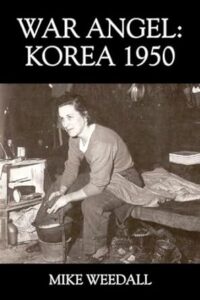
I worked for thirty-plus years promoting energy efficiency. With the programs I managed and was involved in, the amount of electricity we reduced meant four power plants weren't built.
Why do you write?
Digging into the fascinating stories of individuals in history has been a passion of mine all my life. Getting the chance now to discover and write about courageous and fascinating people is a dream come true.
Where did you get the inspiration for your current book?
I love to discover people who did amazing things, but never have gotten recognition. The women of the US Army who served in the Korean War did so when regulations prohibited men from serving in that function. Being right behind the frontline fighting and dealing with horrific combat wounds in selfless service is a story more people should know about.
What do you enjoy the most about your genre?
The stories never cease to amaze me. E-mail me, and I'll share a few that you'll shake your head at.
How would you describe your writing process?
It's hard. I usually have far too much material to make a book pace well. I hate to look at what I leave on the cutting room floor.
What do you think authors have to gain from participating in social media?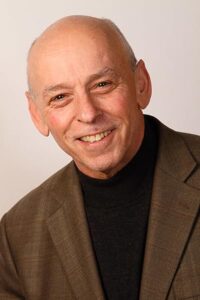
Sharing the stories other people would never have discovered on their own.
What advice would you have for other writers?
Hang in there. It's hard working alone, but when you get to reading how readers love what you've done, it's all worthwhile.
How do you select your books’ titles and covers?
I work with a professional. I want to ensure that the prospective reader sees a vision of what is between the covers. For example, with my current book “War Angel: Korea 1950,” look at the conditions that nurse must put up with. And that's her downtime that might have followed ten-plus hours of surgeries.
What's your next step?
Check out the term “Maroons” in Wikipedia. The largest one in North America was in The Great Dismal Swamp. The story of the brave fugitive slaves who lived there is my next book.
What book do you wish you had written?
David McCullough's “Truman,” or any of McCullough's books. The way he gets inside the heads of his characters is fascinating.
How do you react to seeing a new review for your book?
They have typically been good, so it's usually a positive for me. When I do see the occasional negative review, I have to resist wanting to explain to the reviewer what they missed. Instead, I have to take the negative and learn from it.
VISIT MIKE'S WEBSITE
FIND MIKE'S BOOK
Jan 23, 2024 | Editors' Blog, Interviews
Today, we’re talking with Cornelia E. Davis, MD, about her book Disrupter: How Dr. Connie's Team Eradicated Smallpox in India.
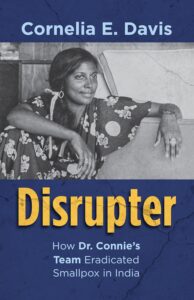 Tell us something unexpected about yourself!
Tell us something unexpected about yourself!
I trekked to Base Camp, Mt. Everest in 1976 during the time I worked on smallpox eradication in India. After working steadily for 18 months on smallpox, I asked to take a little vacation before the certification team was expected to arrive. I still marvel that I trekked to Base Camp!
Why do you write?
I have several reasons to write. One is to leave a legacy to my daughter so she knows some of the things I've done with my life. I'd also like to encourage young women, and particularly women of color, to move out of their comfort zone and try something different! One person can make a difference in the world.
Where did you get the inspiration for your current book?
I was offered a chance opportunity to work on eradicating a disease that many said was an impossible feat. At times it felt almost impossible due to the language and cultural barriers I had to overcome. But the important thing is to not give up! You have to be persistent.
What do you enjoy the most about your genre?
In writing memoirs, you get a chance to remember and relive events in your life. That can be a “two-edged sword” but it works for me.
How would you describe your writing process?
I imagine sitting among a group of friends at dinner and then regaling them about what happened. I get caught up in the storytelling, and the words just flow.
What do you think authors have to gain from participating in social media?
Sometimes I feel social media can be a waste of time. And then someone asks a question that you had never considered. It makes you think and reflect and gain new insights from events that happened.
What advice would you have for other writers?
If you want to write, just do it! Then share those pages with your writers' group who will tell you if your writing drew them in.
How do you select your books’ titles and covers?
It's pretty eclectic! I'll usually come up with the main title. But my editor usually comes up with a catchy subtitle.
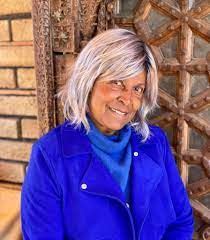 What's your next step?
What's your next step?
I already have the outlines for two additional books. Now, I just have to find the time to start writing. I also like to perform in community theater and I'm involved in a musical that will be opening soon. Once those performances are over, I can focus full time on the writing.
What book do you wish you had written?
That seems like such a strange question. I read books of all genres to be taken to new places, or exposed to new knowledge, or strange worlds. But I don't wish to write those books. I write from my own experiences which sometimes can be almost unbelievable.
How do you react to seeing a new review for your book?
I want people to like my books and to learn new ideas. So you are a little apprehensive at the start of the review, hoping that it will be positive.
VISIT CORNELIA'S WEBSITE
FIND CORNELIA'S BOOK ON AMAZON
Jan 23, 2024 | Editors' Blog, Interviews
Today, we’re talking with Kate Darroch, about her book Thanksgiving in Welcombe Bay (Sweets by the Sea, Christian Second Chance Romance Book 1).
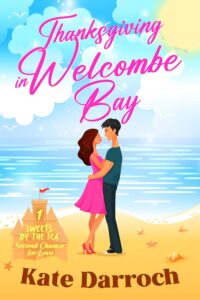 Tell us something unexpected about yourself!
Tell us something unexpected about yourself!
Seven times, I've been as close to death as you can be and not hear angels sing. I think I'm like a cat, and still have two lives left 🙂
Why do you write?
We live in a difficult world. I want to transport people into a happier place, if only for a few hours. And we all need laughter in our lives. Most of my books make most people laugh.
Where did you get the inspiration for your current book?
My most recent release, “Thanksgiving in Welcombe Bay”, is in the Christian Womens' Fiction/Christian Second Chance Romance category, and that's a new genre for me. I never thought I would write a romance, and I still haven't, because this book isn't a romance, it's a tender love story about broken people helping each other to heal. I was inspired to write it in part because, to my great surprise, one of my Cozies won the Incipere Best Christian Fiction award, and many of my readers wrote to tell me “you deserve it”. That was quite stunning for me, because I didn't think of my Cozy, the award winner, “Death in Paris”, as a Christian book. It was, in my mind, just a cute Cozy. Yes, there are faith elements, because the sleuth is a Catholic and her faith is an integral part of her life, but in my own mind I was just writing a Cozy mystery to make people laugh, and it never occurred to me that I was also sharing my own faith with my readers. So I thought, “Well, if people think I write Christian fiction well, maybe I should try to do that, because it's a hard world out there, we need all the comfort and inspiration we get from faith.” The story deals with recovery from addiction to alcohol realistically but sensitively and sympathetically, and I chose that theme because the melodramatic way this subject is usually tackled profoundly irritates me. I showed Eric as an absolutely typical member of AA in early recovery, the good and the bad. The unvarnished reality, factually presented. And one of my editorial team told me I had written a romantic hero of the “cinnamon roll” type. Which was a huge surprise, because I wasn't writing any kind of hero, I was just writing a well-meaning but flawed human being. The other part of my inspiration for this story was Robin Norwood's wonderful Self Help book, “Women Who Love Too Much”. The mental maelstrom in which the emotionally abused woman lives is incomprehensible to almost everyone, including the women themselves. So I presented Lily's mindset as typical of the abused woman who has managed to break free, who is trying to make a new life for herself, because I wanted to show how hard that is to do. I intended to write a story that isn't the story I've actually written. What I see in this book is different from what readers see in it. But I'm still glad that I wrote it because it has brought so much joy to lots of readers, and that's always what I'm trying to do.
What do you enjoy the most about your genre?
I don't actually have a genre. I write Cozies because I enjoy the puzzle type of mystery and I dislike gore; also because no-one minds when you write a Cozy tongue-in-cheek, and I have a dreadful weakness for writing tongue-in-cheek. I write thrillers because I can't help myself – an idea comes to me, and it's a dramatic, action-packed kind of idea, where the main character is pitted against an uncaring universe, and I have a weakness for the uncaring universe type of story. I write unusual ghost stories because I have my little follies and vanities like everyone else, and one of them is standing the conventional on its head. I write the occasional elegant heist because I have a passion for elegant heist and con-artist stories, there aren't enough of them in the world. I write comedy thrillers because hey, ya gotta laugh. As one of my readers once put it, “Everything Kate writes is different from everything else she's written.” And now I've written a series of Christian love stories. Which is really, really, different from everything else I've written. Gift of the muse.
How would you describe your writing process?
What process I've got comes from that famous writer who said, “It isn't enough to wait for inspiration to strike. Sometimes you have to go after it with a club.” The club, for me, is AI. The typical reader prefers the output from a well-handled LLM to the words I put onto paper with such effort. Not all readers, of course. If it were all readers, I don't think I could bear it. Some people do prefer my output to the machine's, and it is for them that I write. I get up each morning and I think, “Today I shall write xyz,” and then I fire up my laptop and my email Inbox opens up and sneers at me. There is nothing, IMO, more destructive to creative thought than email. I have over 4,000 unanswered emails sitting in my Inbox as I sit here talking with you, and every day I process at least 150 emails, often more. I have tried ignoring the Inbox by putting pencil to paper in a notebook before I turn on my laptop, but – and I fully admit this is a weakness in me – I can't do it. The thought of all that unanswered email bites at me, and I can't work creatively until I've spent at least 2 hours trying to reduce the backlog. I never can, of course. New email floods in faster than I can answer it. But after I've spent 2 or 3 hours in the fruitless attempt, I can admit to myself that it's hopeless and go on to other things. And that is when I commune with my muse, if she's in the mood to visit, and if not, I put words on paper anyway. Let us say that my muse has flitted off, as she so often does. The thing is, writers write. We do not allow the absence of our inspiration (or the presence of 4000+ crushing emails) to deter us from the crucial task of messing up a virgin sheet of paper with words. I call myself a writer. Perhaps that is vanity on my part. But as long as I'm calling myself a writer, then putting words on paper is what I must do daily. And the best method I have found is writing something other than what in theory I am writing. It destroys what many other writers have described as their nemesis, staring at a blank sheet of paper. I never stare at a blank sheet of paper. If my job today is to write another chapter of my current work in progress, or a fact article, or a blog post, and I just can't face doing it, then I write a letter, or I edit something earlier written, or add to my notes, or if I'm really desperate, I answer some more email. That is guaranteed to bring me to the point where eventually, words that I actually want to put on paper start appearing. The crucial thing is to keep on putting the wrong words on paper until the right words start to flow.
What do you think authors have to gain from participating in social media?
The whole world. A writer I know, who is successful and wealthy, regularly rides the bus to his destination instead of driving there. Why? He wants to listen to people talking, get the cadence of their speech. But who needs a bus? Go on reddit, on Facebook, hey, even Pinterest can give you what you need, the daily interaction with the reading public which is the lifeblood of your writing. It is so sad that so many indie authors think that social media is about marketing, about posting Buy my Book! It is about Listening, about Conversing, about Learning how to write from the only people who can teach you, Readers. Plus, of course, it's the best and quickest way to “do your bit” in your author communites. We can't just take and take, we have to give back too. It's one of Life's funny little quirks, that the more you pour into your online communities, just from a grateful desire to give back what was freely given to you, to pay it forward, to make an effort to help those at the beginning of their journey, to share in the truest meaning of the word, then the better your writing will get.
What advice would you have for other writers?
The same as Churchill's. Never, never, never, never, never, never ever, give up! Keep on trying, no matter what. Send your soul out into an uncaring universe, clothed in words, even when your heart is naked and shivering in the biting winds of the callousness which surrounds you. Remember that there are people to whom your words will bring joy, even if that's hard to believe when it seems that your work is unappreciated. And join an author community for your genre, because the support of your fellow writers will uplift you.
How do you select your books’ titles and covers?
I am immensely lucky, because I have both a very engaged audience and a very supportive author community. I consult my Readers Club of over 9,000 members about my titles and covers, and usually I get 2000+ replies. So I'm pretty clear about what my readers want to see on my covers. The Cozy author community, of which I'm proud to be a member, and the Christian author community, are two of the most supportive author communities on earth. I shall never forget the kindness I was shown when as a fledgling writer I ventured to make a comment in a group or two. Well-known authors flocked to share their wisdom with me. The degree of encouragement I was given simply cannot be overstated. Everyone was so nice to me that it made me cry because I was so grateful to them for accepting me as a writer.
What's your next step?
I'm sending Màiri back in time. She's a child of the 1970s, and I'm sending her back to the 1920s. It should be a riot. I already have the covers, they're gorgeous. But not until after I've completed the Sweets By The Sea series. People really want to know whether things are going to work out for Eric and Lily in Welcombe Bay, and it's not fair to keep them waiting.
What book do you wish you had written?
I cannot even tell you which book I most admire. There are so many. At different times in my life, I have admired a particular book by a very special author more than any other, but later I would read another book, by a different author, and admire that still more. I have been reading omnivorously since I was 3 years old. And yet there are still literally thousands of authors on my TBR list. How can I choose just one book which sets my soul on fire, when so many already have? And so many are as yet unknown to me? Because my soul would have to be in a furnace, for me ever to wish that I had written another person's book, instead of wishing to write whatever is my own quintissential book – however inferior, viewed as a work of art, that book of mine may turn out to be. Half a dozen different books, by half a dozen great writers, have affected me so strongly that it is no exaggeration to say that they have changed my life. Yet the written opus which moved me emotionally most strongly, and continues to move me most to this day, is The Trojan Women, by Euripides, which is, of course, not a book at all, but a play.
How do you react to seeing a new review for your book?
Seeing a new review is a huge Uplift, a moment of great excitement. When the reader enjoyed my book and is saying something nice about it, that is a moment of absolute joy. I've been very lucky, because at least 4 readers out of 5 say something nice about whichever book of mine they are reviewing, so I get to feel that joy often. When the reader was disappointed by my book and expresses that feeling in a cruel way, it's distressing, but I try to learn from the criticism, and to remember that NO book pleases all readers. When Tolkein brought out “Lord of the Rings”, a work of genius 20 years in the making, which has inspired countless imitators, he was strongly criticised. When Oscar Wilde brought out his works of genius, he was lambasted in a horrible way. Why should my little books escape the calumny visited upon the work of giants, works of a standard so superior to my own writing that I cannot even aspire to it? And if a reader gives constructive criticism, expressing some thought in a way that helps me to see how I could write better, that is a wonderful gift which I treasure.
VISIT KATE'S WEBSITE
FIND KATE'S BOOK ON AMAZON
Jan 23, 2024 | Editors' Blog, Interviews
This week, we’re talking with Darren E. Watling, about his book A Future Apocalypse Caught in a Trilogy.
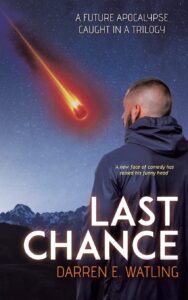
Tell us something unexpected about yourself!
As a drummer in a rock n' roll band for many years, I tried not to drool too much.
Why do you write?
Well…right at this point in time, I'm supposed to be doing the dishes, but my partner is performing the task, as I told her I'm busy buying her something on line.
Where did you get the inspiration for your current book?
I read a short four-page story entitled, ‘Deception', by Jill Stubbs-Mills. Jill submitted her story to the publishers. The review was outstanding. Unfortunately, Jill had succumbed to health issues and was not able to take her story to the next stage. I approached Jill and asked for her blessing to re-write her short story into a novel. Mum was down with that and I simply had to add seventy thousand or so words. When I was a kid, mum made me do dishes.
What do you enjoy the most about your genre?
Call it humorous, but it's hilarious, I find comedy funny.
How would you describe your writing process?
I see a straight line story and stick to it rigidly. I never deviate from thought patterns. (Am I being mean by not doing the dishes?) I begin writing, veering to the left and staggering to the right, eventually and finally arriving at what must be: The end.
What do you think authors have to gain from participating in social media?
I believe, ‘word of mouth', goes a long way. Fortunately, the word of mouth in the form of a projectile vomit that originates in the belly of the ‘happy one star critic', from an evil, dark, humourless, possibly religious out-look on life, (twisted head included), can imitate but a small rock on life's road of apple carts. Do you think I should offer to do the dishes?
What advice would you have for other writers?
Writing your story is like your ticket for the ride. It has just begun.
How do you select your books’ titles and covers?
I mentioned a last chance several times through the book. An apocalypse story- Last Chance it is. I gave an artist my idea for the cover, and first crack, they nailed it. An award winning cover. I'm feeling a bit guilty. I should offer to do them, shouldn't I?
What's your next step?
Book 2, second instalment of the trilogy of trilogies is well underway- The Second Last Chance- ‘Darren has reached deeply into the very bottom of toilet humour.' Ah well, she's nearly finished them now.
What book do you wish you had written?
The bible. A few commandments would relate to tasking the dishes.
How do you react to seeing a new review for your book?
Well, some people consider everyone that has an opinion, they also have an anus and they realise they don't want to listen to either. I for one, must say, from experience, having a conversation with a talking anus can be amusing at first, but soon enough, it gets up your nose.
FIND DARREN'S BOOK ON AMAZON
Dec 5, 2023 | Editors' Blog, Interviews
This week, we’re talking with Richard J Miller, about his book The Sigsbee Deep.
 Tell us something unexpected about yourself!
Tell us something unexpected about yourself!
Hi, it’s nice to finally meet you. Unexpected? Hmm… I'm a former eyeglass maker and actor. I once had a speaking role on ABC's, ‘All My Children.'
Why do you write?
I like to explore the inner life and motivations of my characters. After writing The Sigsbee Deep, a thriller, I realized I had written a love story inside the adventure. I hadn’t seen it that way until I reread the book in its entirety.
Where did you get the inspiration for your current book?
My first book, The Isle of Thom is about a couple trapped on an island that is actually a living creature. They have to find a way to escape before the creature submerges into the sea. That book was the inspiration for The Sigsbee Deep, A Climate-Change thriller that involves a man who must save his children and get them back to their mother before a certain catastrophe happens.
What do you enjoy the most about your genre?
My stories are “Contained Thrillers.” That is, they present a situation that will end in disaster except for the inventiveness of my protagonist in a single location with a ticking clock. Resourcefulness is my genre. What can my hero use to fight his adversary using only the things around him?
I compare my book to Castaway and “The Flight of the Phoenix” by Elleston Trevor.
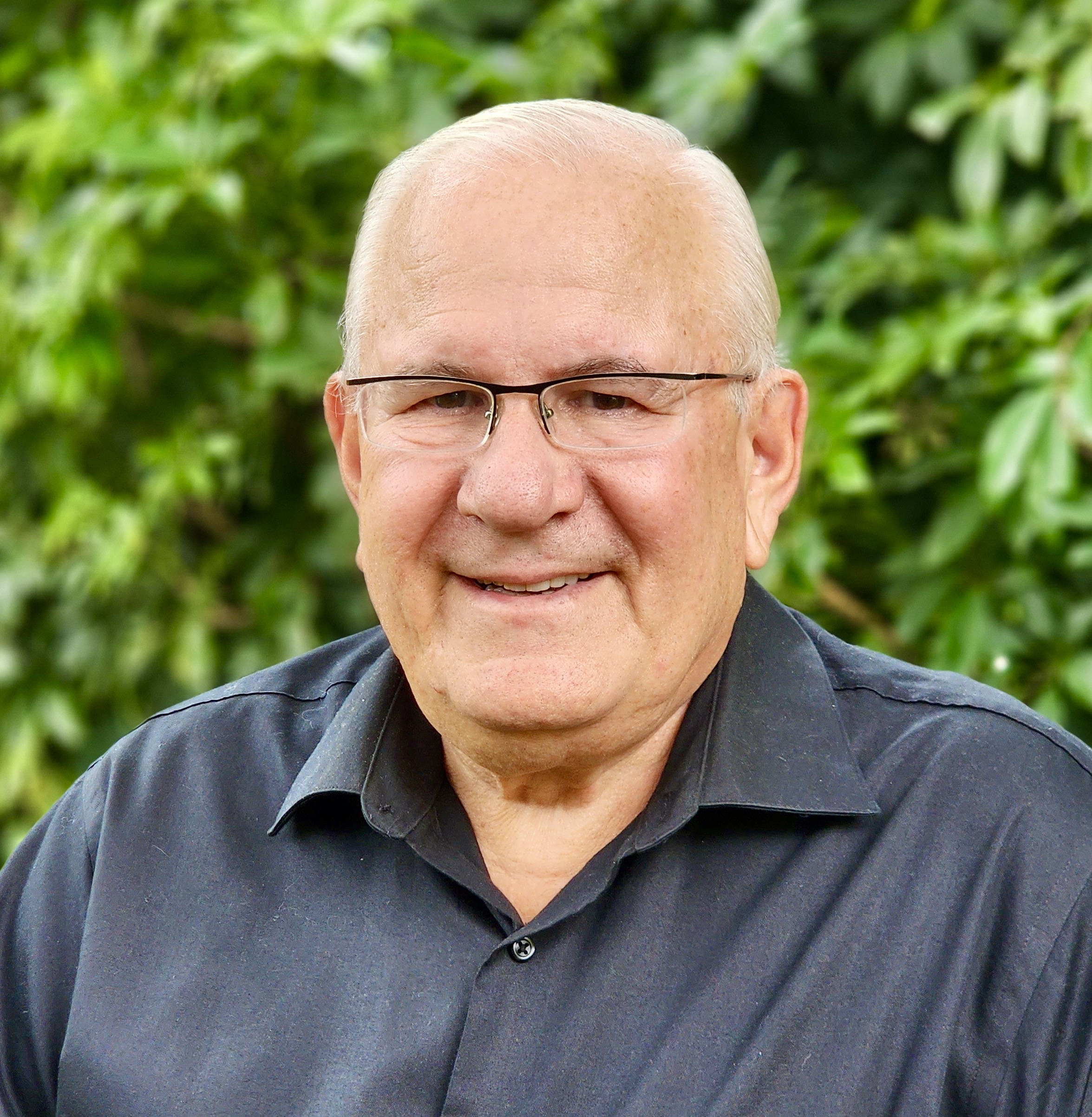
How would you describe your writing process?
Good question. My acting teacher in New York referred to it as, “free Falling.” it is that place I try to get to where my characters write the book, I just provide the fingers. I try to sit in the back seat and let them tell me what to say and do. For instance, in The Sigsbee Deep, an unwanted character joins the family in the escape vessel. I had NO idea that was going to happen. None.
What do you think authors have to gain from participating in social media?
I wish I had a great answer, exposure I guess. I tried to make my book cover visually interesting because I knew I was going to give the book to BGS at some time, and that imagery is everything.
What advice would you have for other writers?
I’m confident about this answer. It is TRUST YOUR CREATIVITY. You are sticky tape. things have stuck to you your entire life. You might know an interesting fact that can be used in your book. Write fast, don't edit. Writing fast keeps the self doubt and the inner critic in the back seat. Trust yourself and trust what you know. Let your characters guide you. CREATE OBSTACLES. A story without obstacles is boring. USE YOUR FIVE SENSES in your scenes. Use the environment, sea sounds, the buzz of an old light fixture…something. React to smoking…whatever. If I read a paragraph and I don't smell something or see some side eye, or an interesting character or imagery–I'm bored.
How do you select your books’ titles and covers?
As soon as I learned that The Sigsbee Deep was a real place, I was hooked on that for the title. I wanted the book cover to leave no doubt that this was an ADVENTURE. Subtlety would not have worked. I wanted the cover to appeal to younger audience too. It's not written as a YA novel, but YA's LOVE The Sigsbee Deep (as I get told by the kids of readers).
What's your next step?
I have a book that I started 23 years ago, “Veterans Day”, a story that is about a Vietnam Veteran who is the superintendent of an apartment building in New York City. I wrote and performed the play in 1993. It takes place 20 years after the war in 1997. I want to go back to it and rediscover the character of Leonard Baker that I created on stage so many years ago.

What book do you wish you had written?
I wish I had written, ‘Castaway.” But actually there was no book that preceded the movie with Tom Hanks.
How do you react to seeing a new review for your book?
I'm over the moon thrilled when people get me and get the story. My first reviews were two years ago on Goodreads. My book earned a Recommend rating from Kirkus Reviews. I’m very proud of that. When I saw their review, I cried. Thanks for talking
with me today.
VISIT RICHARD'S WEBSITE
FOLLOW RICHARD ON GOODREADS





 Tell us something unexpected about yourself!
Tell us something unexpected about yourself! What's your next step?
What's your next step? Tell us something unexpected about yourself!
Tell us something unexpected about yourself!

 Tell us something unexpected about yourself!
Tell us something unexpected about yourself!


